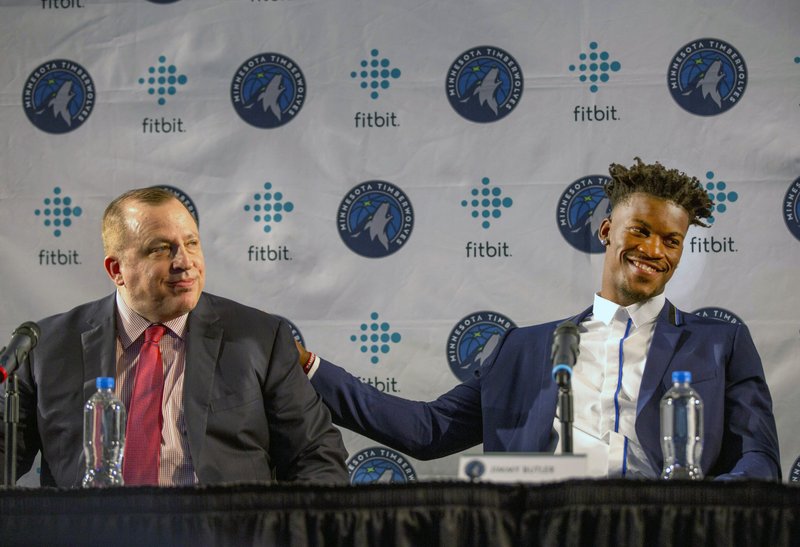Thank you for the zombies: A tribute to George A. Romero

In this June 29, 2017, file photo, Minnesota Timberwolves new point guard Jimmy Butler, right, pats Timberwolves head coach Tom Thibodeau on the back during a press conference at Mall of America in Bloomington, Minn. The NBA has for years had an issue with the Western Conference being superior to the East, but next season promises to have the widest talent gap yet after a flurry of stars left their teams in the East to try to challenge the mighty Warriors in the West. | AP File Photo/Andy Clayton-King
MANILA, Philippines - In one of their very many sleepless nights, two call center agents, both of them friends exploring the possibility of a romantic relationship, are killing time by talking about random things over instant ramen. Then they talk about what they would hypothetically do should the streets be filled with zombies. As they start volunteering survival tactics, zombies start appearing, slowly but surely cornering the brightly-lit convenience store where the two could-be lovers are merrily musing over the undead to survive yet another late-night ennui. Without knowing it, these two insomniacs are actually protagonists of Prime Cruz’s charmingly quaint romance
Sleepless, the twist being that they themselves are zombies with their routine and lackluster lifestyle of working nights while everybody else is sleeping. Their imaginations are active and they conjure the walking dead out of their shared state of having nothing else to do, and while the zombies they create are cute, they still adhere to that same philosophy of creeping and doom.
Sure, those animated corpses will never reach the bored young romantics and will not be the cause of their sad separation. Other, more pressing real world issues will thwart their budding love. Nevertheless, the fact that zombies make an appearance in a romance that aims to dissect the minds of millennials shows that these mindless, rotting creatures have come a long way from just being horror flick staples. They have become a recurring obsession.
Truly, we are living in a world where zombies rule.
Everything started in 1968 when George A. Romero released Night of the Living Dead to an unsuspecting public. While zombies existed in cinema before (Val Lewton’s I Walk With a Zombie, Vincent Price in The Last Man on Earth), it was Romero who imagined them outside the realm of an overlord controlling them through voodoo or science for some sort of villainous end. Romero’s zombies simply existed without the benefit of reason, logic or lore. They were ridiculously slow, but they attacked in hordes, and when they did attack, they did so with the objective of satisfying a bottomless hunger that led to their victims being dismembered, disemboweled, and mangled like pieces of meat. Without any narrative motivation, zombies were suddenly ripe to be turned into metaphors for everything and anything that is wrong with society. It certainly helped that Night had an African-American protagonist, which immediately turned the horror flick into something politically charged, even if Romero had no intentions of tackling racial issues. The sequels Dawn of the Dead (1978), Day of the Dead (1985) and Land of the Dead (2005) had a lot more plot than stragglers trying to survive amid an army of the undead. They were also more overt in their commentaries about society. Romero had a few other non-zombie films like Creepshow (1982), The Dark Half (1993) and Bruiser (2000), all fine films if not intriguing failures, but it was his Dead films that he will be remembered for the most.
The zombies of today’s cinema have been filtered through the ages. They have been linked to viruses and disease in Danny Boyle’s 28 Days Later (2002). They have evolved to match today’s high-speed lifestyle, sprinting like Olympians instead of clumsily dragging their heavy bodies around in Zack Snyder’s Dawn of the Dead remake (2004). They’ve been spirited away from the horror genre and have been groomed for comedy in Edgar Wright’s Shaun of the Dead (2004) and romance in Jonathan Levine’s Warm Bodies (2013).
Filipino filmmakers have also attempted to utilize zombies to entertain their audience. Brandon Relucio and Ivan Zaldarriaga’s Di Ingon ‘Nato is set in a remote Cebu town overrun by the dead. In T. A. Acierto’s The Grave Bandits (2012), two youngsters are chased around an island of re-animated corpses. The middle portion of Chito Rono’s Shake, Rattle and Roll: The Invasion featured Philippine soldiers turning into zombies. Then there’s Sherad Anthony Sanchez’s Salvage that also had soldiers turning into zombies in an effort to state something drastically political about the affairs in Mindanao through the horror genre.
George A. Romero died last July 16 after battling lung cancer. He left a world singularly obsessed with those abominations he first crafted with a minuscule budget, an army of willing extras, plenty of makeup, and a grandiose resolve to make a film and be a filmmaker.
Mr. Romero, from the bottom of my still-beating heart, thank you for the zombies.















